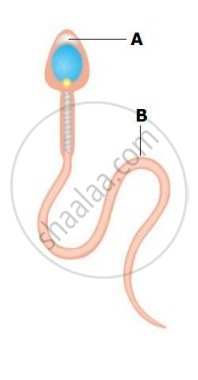Advertisements
Advertisements
Question
In meiosis, the number of chromosomes becomes ___________.
Options
multiple times
triple
half
double
Solution
In meiosis, the number of chromosomes becomes half.
APPEARS IN
RELATED QUESTIONS
Give the name and function for ‘A’ and ‘B’ from the diagram given below

The following is the illustration of the sequence of ovarian events (a − i) in a human female

(i) Identify the figure that illustrates ovulation and mention the stage of oogenesis it represents.
(ii) Name the ovarian hormone and the pituitary hormone that have caused the above mentioned event.
(iii) Explain the changes that occur in the uterus simultaneously in anticipation.
(iv) Write the difference between ‘c’ and ‘h’.
(v) Draw a labeled sketch of the structure of a human ovum prior to fertilization.
What is oogenesis? Give a brief account of oogenesis.
Fill in the blank.
Implantation of embryo occurs in ------
Give scientific reason.
There is a menopause when women are 45-50 years old.
The secondary oocyte enter into the fallopian tube through the ______.
Which of the following events take place during spermatogenesis?
Conversion of spermatid into sperm is called as _______.
It The cell division in secondary oocyte is suspended at ______.
Which among the following has 23 chromosomes?
Cavity of graafian follicle is ______.
How many sperms are formed from 4 primary spermatocytes?
The process of release of spermatozoa from Sertoli cells into cavity of the seminiferous tubules is called ______.
1st polar body is formed at which stage of oogenesis?
If for a species 2n = 16, then during Ist prophase and IInd prophase of the meiotic division of a cell, how many tetrads and diads will be formed:
Capacitation refers to changes in the ______.
Germ cells present in the seminiferous tubules undergo ______
What is the difference between a primary oocyte and a secondary oocyte?
In spermatogenesis, at the end of the first meiotic division ______ are formed.
Name the germinal layers from which the following organs develop: Tongue, heart, sweat glands, vagina, mammary glands, kidney.
